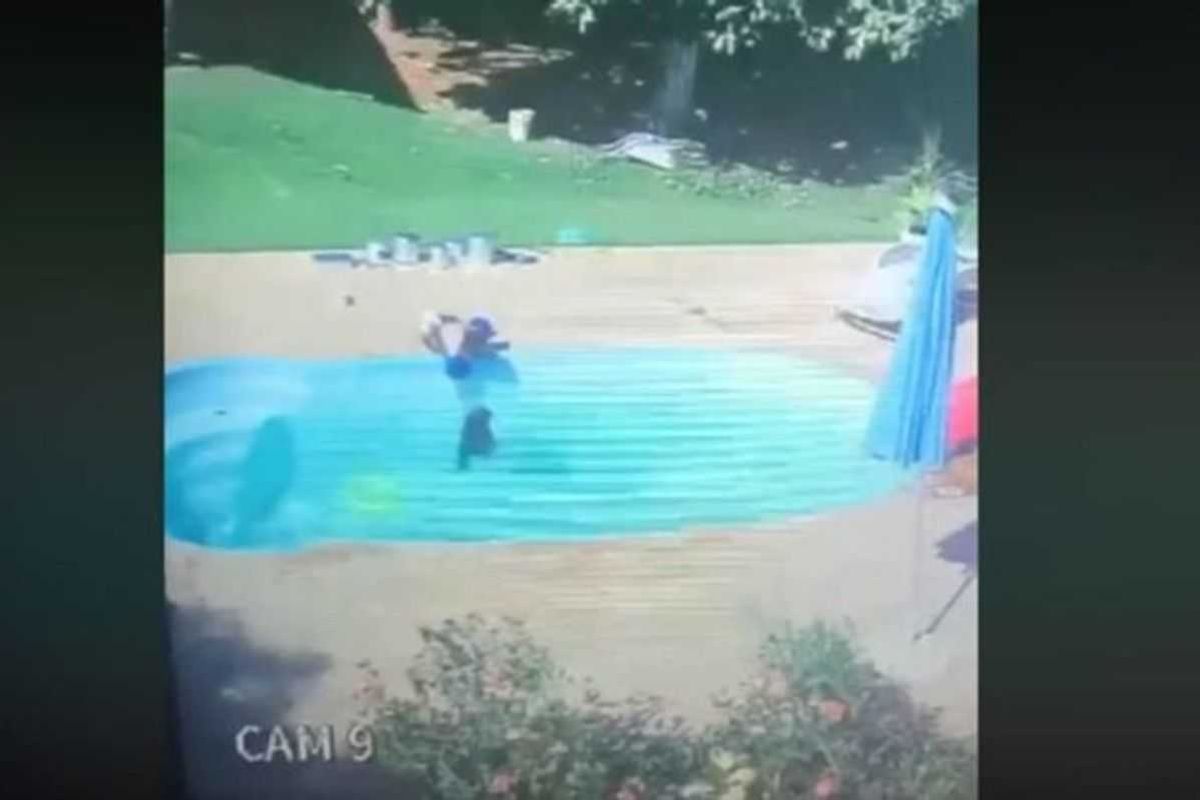Security camera footage captures a 3-year-old boy rescuing his friend from drowning
The police called him a "hero."
A 3-year-old saved his friend from a backyard swimming pool.
Swimming pools can provide endless hours of fun in the sun, but they can also be extremely dangerous for young children who haven't learned to swim. According to the World Health Organization, around 300,000 people die from drowning each year, and about a quarter of those drowning victims are children under age 5.
In 2020, at a residence in Itaperuna, a city north of Rio de Janeiro, a harrowing scene unfolded in a backyard swimming pool. According to the Daily Mail, Henrique, a 3-year-old child of a worker on the property, snuck away from his parents' supervision and wandered over to the pool. Security camera footage shows the young boy and fellow 3-year-old, Arthur de Oliveira, sitting next to the pool when Henrique reaches for an inflatable floaty and falls into the water.
A frantic Arthur looks around for help, but there is no one to be found. For 10 seconds, Henqriue struggles to keep his head above water, until Arthur bravely extends his hand and pulls the boy up. If Arthur didn't have the strength, he could have fallen in the pool and both boys could have drowned.
Luckily, Arthur's strength held up and he pulled the boy to safety."This video serves as an alert for those who have a pool at home and children," wrote Arthur's mom, Poliana Console de Oliveira on her Facebook page. "Thank God the ending is happy, because God sent the land under my care, my son, my little Arthur, a true hero! Real life hero, my pride."
- YouTube www.youtube.com
"Arthur saved his friend's life," she added. Arthur hopes to be a police officer one day, so after the local police department learned of his bravery, it sent him a new basketball and a whole lot of candy. The boy was also given a certificate and a trophy that said, "From a hero to a hero."
While Arthur's heroism is worthy of recognition, it's also important to know how to avoid these kinds of near-tragedies. Safekids.org recommends these tips for watching kids when there's a body of water around:
- Watch kids when they are in or around water. Keep young children and weak swimmers within arm’s reach of an adult. Make sure more experienced swimmers are with a partner every time.
- Choose a Water Watcher. When there are several adults present, choose one to be responsible for watching children in or near the water for a certain period of time, such as 15 minutes. After 15 minutes, select another adult to be the Water Watcher.
- Avoid distractions when your child is in or around water. Drowning is often silent and can occur in less than five minutes, so it is important to give your child all of your attention. Put away phones, books and magazines.
And for pool safety specifically, Safekids.org makes these recommendations:
- Install fences around home pools. A pool fence should surround all sides of the pool and be at least four feet tall with self-closing and self-latching gates.
- Be aware of pool drains. Teach your child not to or swim near pool drains or suction outlets. Visit Pool Safely to learn more about available resources to keep kids safe around pool drains.
- Empty kids’ pools immediately after use. Store them upside down and out of children’s reach.
This article originally appeared five years ago.

